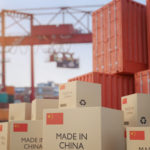Mexico is the second largest export market for the U.S. and is gaining fast on Canada, but the trading future with our neighbor to the south is in jeopardy thanks to the current administration’s feelings about NAFTA.
President Trump and other political leaders often blame what they call the “unfair” North American Free Trade Agreement for the loss of manufacturing jobs in the U.S. since it was enacted in 1994. Trump specifically targeted the trade deal during the campaign and has continued to berate it since taking office, claiming he wants to renegotiate or even scrap the agreement.
But automation has more to do with the manufacturing jobs dip than the trade deal, according to Jon Melchi, director of government affairs for Heating, Air-conditioning & Refrigeration Distributors International, and NAFTA remains a good deal for businesses in all three nations.
“NAFTA has been a huge success for the U.S., Canada and Mexico,” Melchi said last week during comments to HARDI’s Mexican Market Summit at the association’s annual conference in Las Vegas, NV.
However, Melchi understands that objections to NAFTA are strong and centered on three factors:
- Labor unions believe workers are treated unfairly in Mexico.
- Mexico isn’t held to the same environmental standards as the U.S.
- Many believe that manufacturing jobs would come back if NAFTA were repealed.
What’s likely to happen during the next round of negotiations, Melchi said, is that the U.S. will ask for three changes for the deal to continue:
- Mexico will need to increase environmental and labor standards.
- Resolutions of trade disagreements will need to be altered (this affects U.S.-Canada trade more).
- The rules of origin will need to be altered.
“It is extremely unlikely that we pull out,” Melchi said. “Businesses fund U.S. politics and U.S. businesses do not want NAFTA to go away.”
But the “unpredictable” nature of Trump means the future of NAFTA still hangs in the balance, as a Bloomberg article explained and which I outlined in a recent blog. Trump also has proven to have a protectionist outlook, as evidenced by his decision to remove the U.S. from the Trans-Pacific Partnership and his staunch pledge to put “America first.”
Though NAFTA will likely remain in some form, Melchi says, Trump is likely to try and put his own stamp on a renegotiated deal.
Related Posts
-
The U.S. Census Bureau announced that the combined value of distributive trade sales and manufacturers’…
-
Mark Collett will remain president of Bloom.
-
The U.S. Census Bureau reported that the combined value of distributive trade sales and manufacturers’…





